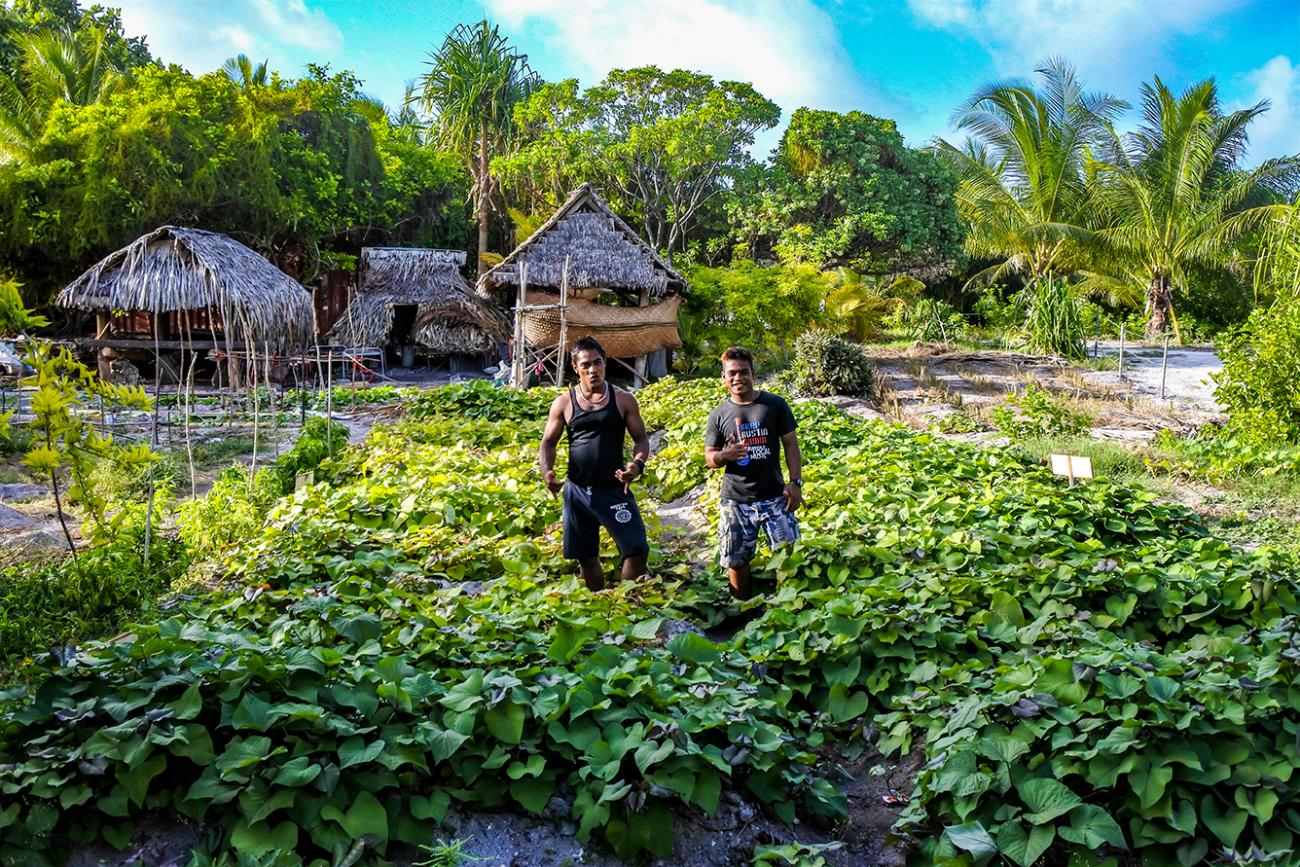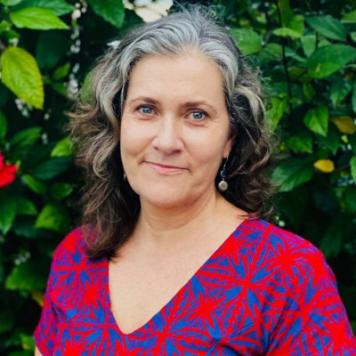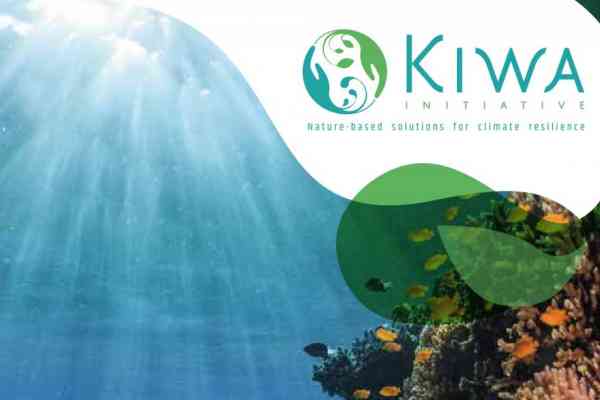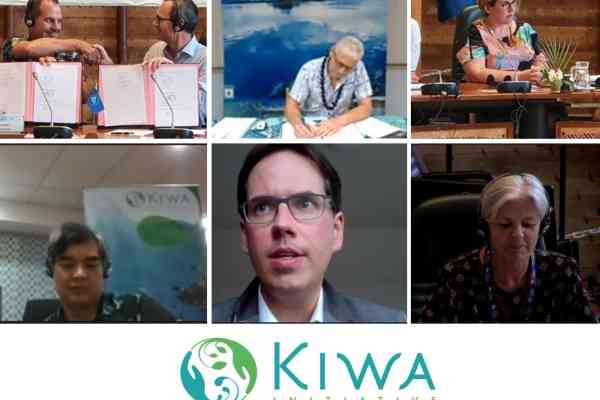The Pacific Island countries and territories are particularly vulnerable to the effects of climate change. These territories are already exposed to a variety of large-scale climate hazards such as the increase in air temperature and ocean warming, sea level rise, tropical cyclones, flooding, droughts and salinization of groundwater. Such phenomena threaten the livelihoods and subsistence of Pacific communities.
We need to take urgent climate action and make nature our ally.
The climate emergency led the French President to commit with the European Union, during the December 2017 One Planet Summit, to setting up a donor coalition to support Pacific Island countries and territories as they seek common solutions to climate change.
The Kiwa Initiative, born of that commitment and managed by the Agence française de développement (French Development Agency - AFD), is a unique EUR 35 million* multi-donor initiative (European Union, France, Canada, Australia and New Zealand) in the Pacific that aims to make Pacific Island ecosystems, economies and communities more resilient to the impacts of climate change through Nature-based Solutions (NbS). The International Union for Conservation of Nature (IUCN) defines NbS as “actions to protect, sustainably manage, and restore natural or modified ecosystems, that address societal challenges effectively and adaptively…”.
A number of experiments have shown that natural resources can not only be restored but can then serve to protect communities and ecosystems from climate change through restoration of coastal ecosystems (coral reefs and mangroves), agroecology and organic agriculture, all of which are good examples of NbS, which can provide sustainable responses to the impacts of climate change.
Pacific Organic Learning Farm Network
After launch of the initiative in 2020, AFD signed a funding agreement with the Pacific Community in May 2021 to set up the Pacific Organic Learning Farm Network, the first regional project supported by the Kiwa Initiative.
This project aims at addressing the challenges of climate change adaptation, food security and biodiversity projection in the Pacific by promoting organic farming and agro-ecological production techniques and methods. The network will be set up in Fiji, Nauru, the Solomon Islands and Tonga. It will also help foster regional integration of the French Pacific territories through the exchange of good practices in Wallis and Futuna, New Caledonia and French Polynesia.
The project is embedded in each of the territories and will support volunteer local farmers in their transition to the use and promotion of sustainable organic production and food systems, based on NbS. Finally, the project facilitates the development of economic opportunities for those farmers.
These solutions directly address the climate-change adaptation, biodiversity protection, food security, and economic resilience issues that Pacific Island communities are experiencing.
Proponents for organic agriculture
The farms will become learning centres to demonstrate the benefits of biodiversity, agroecology, agroforestry and organic production methods and technologies.
These farmer-run training centres, i.e. the farms and the organic learning farm network, will help provide a source of income as well as a host of environmental benefits such as long-term agricultural production sustainability, cleaner water, climate change mitigation through carbon sequestration, greater biodiversity, rejection of genetically modified organisms (GMOs), soil forming and conditioning, waste recycling, protection of pollinators, and more. Smallholder farmers have a deep-seated cultural and professional connection to the land and will fully play their role as proponents of both organic farming and the project. Organic agriculture has also proven to be a tool to support women and youth by helping them identify new career opportunities in agriculture.
Building on and disseminating knowledge
The Organic Network will also have an impact beyond the local farmer and community. It will support achievement of the United Nation’s Sustainable Development Goals, including Goal 2 on Zero Hunger, Goal 5 on Gender Equality, Goal 13 on Climate Change and Goal 17 on conservation and sustainable land use.
To create a healthy food system that is resilient to climate change and public health adversities, the Network will need a solid foundation of knowledge, experience and dissemination. SPC’s Land Resources Division (LRD) will use POETCom – the Pacific Organic and Ethical Trade Community – to manage the network.
A bold approach is vital
An SPC-LRD-based project, POETCom has more than a decade of experience in Pacific organics, expanding the organic and ethical trade movement and contributing to a productive, resilient, sustainable and healthy region. POETCom’s expertise in promoting organic agriculture, organic certification and managing other organic projects throughout the Pacific will give the Network the strategic direction it needs for success.
After COVID-19 and the recent string of tropical cyclones and climate-related emergencies, the Pacific needs bold solutions to its increasingly threatened farms and food systems. The response must look at more than basic economics and be holistic: a balanced system that takes into account nature, nutrition, knowledge and our neighbours. The Pacific Organic Learning Farm Network is a step towards that balance: for a resilient Pacific, the future is in its peoples and its nature.
This blog was produced in the frame of the Kiwa Initiative with the support of the European Union (EU), Agence Française de Développement (AFD), Global Affairs Canada (GAC), Australian Government Department of Foreign Affairs and Trade (DFAT), New Zealand Ministry of Foreign Affairs and Trade (MFAT). Its content is the sole responsibility of AFD and SPC and does not necessarily reflect the views of the donors.
* The total amount is subject to the approval of an addendum to the contribution agreement between AFD and the European Union for an additional contribution of EUR 4 million from the European Union.
The Kiwa Initiative is funded by:
In partnership with:



